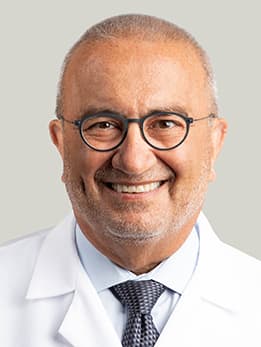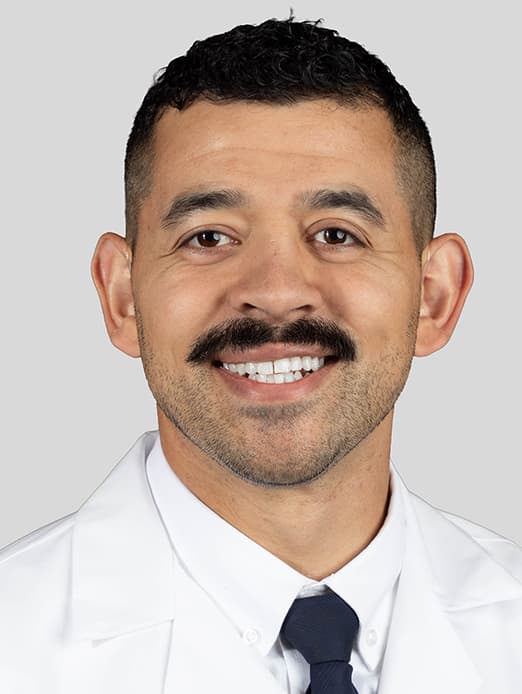Stroke Treatment
Treatment for Stroke
Our dedicated team of experts offers the highest level of treatment for stroke, including surgical treatment options.
Emergency treatment for stroke depends on whether you're having an acute ischemic stroke or a stroke that involves bleeding into the brain (hemorrhagic).
Acute Ischemic Stroke Surgical Intervention
In patients who have suffered an acute ischemic stroke or cortical brain thrombosis, our specialists use advanced surgical techniques to remove the clots and restore blood flow quickly. This sophisticated procedure is called intracranial mechanical thrombectomy/embolectomy. Our highly skilled neuroendovascular surgeons perform this surgery using minimally invasive methods, accessing the brain or spinal cord through small incisions in the wrist or groin area. They use specialized microcatheter systems to retrieve clots from the central nervous system, restoring normal blood flow and reducing the damage caused by strokes.
UChicago Medicine is a leading facility in the country for performing these procedures and offers patients large bore catheter solutions, which are safer and more effective than traditional stroke therapy. Additionally, our interventionalists are at the forefront of acute intracranial stenting trials to treat acute intracranial atherosclerosis disease (ICAD).
Hemorrhagic Stroke Intervention
The treatment for hemorrhagic stroke depends on where the bleeding occurs in the brain. There are different types of hemorrhagic stroke:
- Intraparenchymal Hemorrhage (IPH): Bleeding within the brain.
- Subdural Hemorrhage or Epidural Hemorrhage: Bleeding on the surface between the brain and the skull.
- Subarachnoid Hemorrhage (SAH) and Intraventricular Hemorrhage (IVH): Bleeding within the cerebrospinal fluid space.
Our experts focus on reducing the pressure on the brain and quickly stopping the bleeding. They also work to repair the underlying cause, relieve symptoms and prevent complications like permanent brain damage. Hemorrhagic stroke can be caused by conditions such as hypertension, amyloid angiopathy, cavernous malformation, arteriovenous malformation (AVM), arteriovenous fistula (AVF) or brain aneurysm. Some cases may require surgery, embolization or both to treat the underlying condition.
A brain aneurysm is a weakened area in a blood vessel in the brain. If left untreated, it can potentially ruptureleading to severe bleeding inside the brain.
We use advanced technology to safely access and treat brain aneurysms through small incisions in the wrist or groin area. Advanced catheter systems and devices are used to prevent bleeding from the aneurysm. There are two main techniques used to treat brain aneurysms:
- Flow disruption with intrasaccular devices or coils: This involves inserting special devices or coils into the aneurysm to disrupt blood flow and prevent it from rupturing.
- Flow diversion using specialized metal stents: This technique uses metal stents to divert blood flow away from the aneurysm, reducing the risk of rupture.
Intrasaccular devices offer the safest and most durable method to treat brain aneurysms.
Arteriovenous malformations (AVM) and arteriovenous fistulas (AVF) are abnormal connections between arteries and veins in the brain. AVM are tangled connections between arteries and veins, while AVF is an abnormal connection between an artery in the dura, which is the outer membrane covering the brain or spinal cord and a vein in the brain or spinal cord.
If left untreated, these abnormalities can lead to severe and dangerous brain bleeds, such as hemorrhagic stroke. Our experienced team offers the best treatments for these complex conditions including open surgery, radiation surgery or embolization.
In embolization, various liquid embolic materials that are tailored to fit the specific characteristics of the AVM or AVF are used. This approach allows us to achieve the highest success rates in treating these lesions, providing the best possible outcomes for our patients.
A spinal arteriovenous malformation and arteriovenous fistula (spinal AVM and AVF) is an abnormal connection between blood vessels in or near the spine. This condition can cause bleeding or pooling of blood around the spinal cord (venous congestion), leading to significant problems such as weakness or paralysis in the lower extremities, sensory changes and issues with bowel or bladder control.
To diagnose this condition, our experts have developed an advanced spine magnetic resonance (MR) sequence that can identify these lesions without the need for invasive procedures.
Our experienced team offers the best treatments for these complex conditions including open surgery, radiation surgery or embolization. Endovascular embolization is a highly effective technique in treating spinal AVM and AVF. Our skilled neuroendovascular surgeons are experts in using different liquid embolic materials tailored to each specific case, ensuring the highest success rates in treating these lesions.
A subdural hematoma is bleeding on the surface between the brain and the skull. This can occur spontaneously or as a result of head trauma.
To treat subdural hematomas, our skilled neuroendovascular surgeons use minimally invasive techniques to stop the bleeding from the leaking blood vessels, which often eliminates the need for more invasive surgery.
Surgical Stroke Prevention
Intracranial angioplasty and stenting are procedures used to restore blood flow through narrowed blood vessels inside the skull. This narrowing is caused by a condition called intracranial atherosclerosis disease (ICAD).
Our multidisciplinary team has made significant advancements in medical therapy and identifying risk factors for ICAD. As a result, these procedures are rarely needed. Instead, we are focusing on conducting research to study the best ways to treat ICAD with medications. To better understand this condition, we have developed sophisticated blood vessel wall imaging (bVWI) magnetic resonance (MR) sequences. This allows us to tailor the management of ICAD more effectively.
In the rare cases where surgical treatment is necessary, our expert neuroendovascular surgeons are highly skilled in using special medication-treated balloons and stents. These tools help restore normal blood flow to the brain.
The carotid arteries are the main blood vessels responsible for delivering blood to the brain. When these arteries become narrowed or blocked, it can lead to a type of stroke called ischemic stroke.
To treat ischemic stroke, a procedure called carotid balloon angioplasty and stenting is used. During the procedure, our surgeons make a small incision in the wrist or groin area, allowing them to access the blocked carotid artery. They perform these procedures with distal protection filter and proximal protection balloon to protect against any potential clots breaking loose and reaching the brain. By carefully reestablishing blood flow to the brain, they can help prevent further damage.
After the procedure, patients receive close monitoring in our NeuroICU to ensure their blood pressure and blood thinning levels are properly controlled. This attentive care is essential for a successful recovery.






